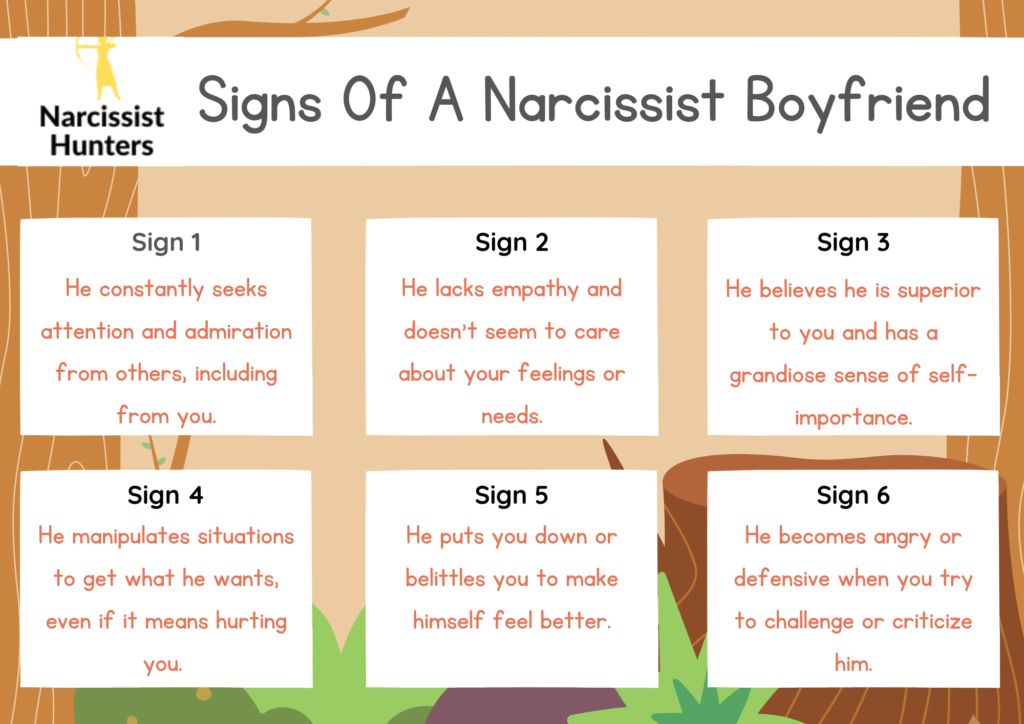Dating a narcissist can be an emotionally draining and challenging experience. Narcissist boyfriends have a distorted sense of self-importance and often prioritize their own needs and desires over their partner’s. For the girlfriend of a narcissist boyfriend, it can be difficult to navigate the relationship and protect your emotional wellbeing. Narcissistic love is emotionally draining and abusive by nature.
In this blog post, I’ll explore who a narcissist boyfriend is, 15 signs to look out for, how a narcissist boyfriend treats his girlfriend, the love language of a narcissistic boyfriend, and practical tips on how to deal with narcissist boyfriend. By the end of this post, you’ll have a better understanding of how to protect yourself in a relationship with a narcissist boyfriend and prioritize your own emotional and physical wellbeing.
Who a Narcissist Boyfriend is?
A narcissistic boyfriend is someone who has Narcissistic Personality Disorder (NPD) or has narcissism personality traits and displays a persistent pattern of grandiosity, an excessive need for admiration, and a lack of empathy for others. In a relationship, a narcissist boyfriend will prioritize his own needs and desires over his partner’s and may engage in manipulative or abusive behaviors.
Importance of Identifying a Narcissist Boyfriend
Identifying a narcissist boyfriend is important because it can help you understand why your relationship may be causing you stress or emotional pain. A narcissistic partner can be manipulative and controlling, and may engage in behaviors such as gaslighting, blaming, and emotional abuse.
Recognizing these patterns of behavior can help you set boundaries and protect your emotional well-being. Additionally, a narcissistic partner may be unwilling or unable to provide the emotional support and intimacy that are necessary for a healthy relationship.
By recognizing these patterns of behavior, you can make informed decisions about how to move forward in your relationship, or whether it may be necessary to end the relationship for your own well-being.
15 Signs Of Narcissist Boyfriend

As the girlfriend of a narcissist boyfriend, it’s important to be aware of the behaviors that may indicate that your boyfriend has narcissistic tendencies. Here’s an explanation of the 15 signs to help you better understand what they mean:
1.He constantly seeks attention and admiration from others, including from you.
This may manifest as a need for constant praise, admiration, or attention from others, including from you. Your partner may demand that you focus on him and his needs to the exclusion of your own.
2. He lacks empathy and doesn’t seem to care about your feelings or needs.
Your partner may have difficulty understanding or empathizing with your emotions and needs. He may dismiss your concerns or trivialize your feelings, leaving you feeling invalidated and unheard.
3. He believes he is superior to you and has a grandiose sense of self-importance.
Your partner may have an inflated sense of self and believe that he is better or more important than others. He may be obsessed with his own achievements, abilities, or appearance.
4. He manipulates situations to get what he wants, even if it means hurting you.
Your partner may use manipulation tactics to get what he wants, even if it means lying, deceiving, or hurting you in the process. He may be willing to go to great lengths to achieve his goals, even at your expense.
5. He has an exaggerated sense of entitlement and expects you to cater to his needs.
Your partner may believe that he deserves special treatment and expects you to cater to his needs without regard for your own.
6. He puts you down or belittles you to make himself feel better.
Your partner may criticize, insult, or put you down in order to boost his own self-esteem. He may make you feel small or inadequate in order to make himself feel superior.
7. He doesn’t respect your boundaries and may try to control your behavior or decisions.
Your partner may have difficulty respecting your boundaries and may try to control your behavior or decisions. He may become angry or resentful if you resist his attempts to control you.
8. He shows little concern for your wellbeing and may exploit you for his own gain.
Your partner may disregard your needs and may use you for his own gain without concern for your wellbeing. He may use you to boost his own ego or to achieve his own goals.
9. He struggles to admit fault or take responsibility for his mistakes
Your partner may have difficulty admitting when he’s wrong or taking responsibility for his mistakes. He may blame others or deflect responsibility onto you instead of owning up to his actions.
10. He is jealous or resentful of your success or achievements.
Your partner may struggle to celebrate your successes or may become jealous or resentful of your achievements. He may feel threatened by your success and may try to downplay or belittle your accomplishments.
11. He constantly needs validation and praise to feel good about himself.
Your partner may have an insatiable need for validation and praise to feel good about himself. He may constantly seek approval from others, including from you, in order to feel worthy.
12. He disregards social norms or rules and may engage in risky or inappropriate behavior.
Your partner may have difficulty conforming to social norms or rules and may engage in risky or inappropriate behavior. He may disregard the consequences of his actions and may put himself or others at risk.
13. He has difficulty maintaining healthy relationships with others.
Your partner may struggle to maintain healthy relationships with others due to his narcissistic tendencies. He may have a pattern of short-lived or tumultuous relationships with others.
14. He becomes angry or defensive when you try to challenge or criticize him.
Your partner may become angry or defensive when you try to challenge or criticize his behavior. He may react with rage, insults, or belittlement, rather than engaging in constructive dialogue or self-reflection.
15. He may be charming and charismatic, but his behavior is often superficial and insincere.
Your partner may be charming and charismatic, but his behavior may be superficial and insincere. He may use his charm to manipulate and control others, and may struggle to form genuine, deep connections with others.
If you notice these signs in your partner, it’s important to take them seriously and consider seeking help.
How a Narcissist Boyfriend Treats his Girlfriend?

As the girlfriend of a narcissist boyfriend, you may have noticed that your partner treats you differently than you would expect in a healthy relationship. Here are some common ways that a narcissistic boyfriend may treat his girlfriend:
1.He may put his needs and wants before yours.
A narcissistic boyfriend often prioritizes his own needs and wants above those of his girlfriend. He may expect you to cater to his every need, even if it means sacrificing your own needs or desires.
2. He lacks empathy
Narcissistic boyfriends often lack empathy, meaning that they struggle to understand or connect with the emotions and experiences of others. This may result in your boyfriend dismissing or invalidating your feelings, leaving you feeling unsupported or unheard.
3. He gaslights you
Gaslighting is a form of emotional manipulation in which a person causes their partner to doubt their own perceptions, memories, or sanity. A narcissist boyfriend may use gaslighting to control or manipulate you, making you doubt your own experiences or feelings. Here are the examples of gaslighitng in narcissitic relationships.
4. He may belittle or criticize you
A narcissist boyfriend may belittle or criticize you in order to boost his own ego or feel superior. He may make you feel small or inadequate in order to make himself feel better.
5. He controls you
Narcissistic boyfriends often seek to control their partners’ behavior, decisions, or actions. He may become angry or resentful if you resist his attempts to control you.
6. He lacks accountability
Narcissistic boyfriends often struggle to take responsibility for their actions and may blame others for their mistakes. Your boyfriend may be unwilling to apologize or admit fault, even if he has hurt you.
7. He may be jealous or envious
Narcissistic boyfriends often struggle with feelings of jealousy or envy, particularly when their partner is successful or receives attention from others. He may become resentful or dismissive of your achievements or accomplishments.
8. He may use you for his own gain
A narcissistic boyfriend may exploit you for his own gain, without concern for your wellbeing. He may use you to boost his own ego or to achieve his own goals, without regard for how his actions may impact you.
Love Language of a Narcissistic Boyfriend

Narcissistic boyfriends may have a skewed love language, in which they prioritize their own needs and desires over their partner’s. Here are some common love languages of narcissistic boyfriends:
A. Gifts and material possessions: Narcissistic boyfriends often use gifts and material possessions to demonstrate their affection, but may use them as a means of control or manipulation. He may use gifts as a way to maintain power in the relationship, or to make you feel indebted to him. We call it usually love bombing phase of a narcissistic relationship.
B. Words of affirmation: Narcissistic boyfriends may use words of affirmation to bolster their own ego, rather than to genuinely express love or affection towards their partner. He may use compliments or flattery to manipulate or control you, or to reinforce his own sense of superiority.
C. Acts of service (if it benefits them): Narcissistic boyfriends may perform acts of service for their partner, but only if it benefits them in some way. For example, he may help you with a task or chore, but only if it makes him look good or reinforces his own sense of superiority.
D. Physical touch (to show ownership): Narcissistic boyfriends may use physical touch to demonstrate ownership or possession of their partner. He may become possessive or jealous if you interact with others, and may use physical touch to assert his dominance or control over you.
How To Deal With Narcissist BoyFriend?
Dealing with a narcissistic boyfriend is not easy but you can follow these strategies to deal with him:
1. Educate yourself
Learn more about narcissistic personality disorder and how it affects relationships. This can help you understand your partner’s behavior and develop strategies to cope.
2. Focus on your own needs
Narcissistic boyfriends often prioritize their own needs and desires over their partner’s. Make sure you are prioritizing your own needs and setting boundaries that protect your emotional wellbeing.
3. Don’t try to change your partner
Narcissistic boyfriends are unlikely to change their behavior, no matter how hard you try to change them. Instead, focus on accepting them for who they are and setting boundaries that protect yourself.
4. Keep a journal
Writing down your thoughts and emotions in a journal can help you process your feelings and identify patterns in your partner’s behavior.
5. Seek support
It can be helpful to seek support from a therapist or counselor who has experience working with individuals in narcissistic relationships. They can provide you with tools and strategies to cope with your partner’s behavior and protect your wellbeing.
6. Practice self-care
Make sure to prioritize your own self-care, including exercise, healthy eating, and getting enough rest. This can help you maintain your emotional and physical wellbeing.
7. Have a support system
Make sure you have a support system of friends and family members who understand your situation and can provide emotional support when needed.
8. Don’t engage in arguments
Narcissistic boyfriends often thrive on conflict and attention. Avoid engaging in arguments or feeding into their need for drama. Instead, focus on staying calm and communicating your needs clearly and calmly.
9. Consider your options
If your partner’s behavior is consistently harmful or emotionally draining, it may be necessary to consider leaving the relationship for your own wellbeing.
Final Thoughts
In conclusion, being in a relationship with a narcissistic boyfriend can be a difficult and emotionally draining experience. It is important to recognize the signs of narcissist boyfriend and prioritize your own emotional and physical well-being.
By understanding your partner’s love language and implementing practical tips to protect yourself, you can navigate the relationship more effectively. Remember that you deserve to be in a healthy and loving relationship, and don’t hesitate to seek professional help or support from loved ones if needed.
